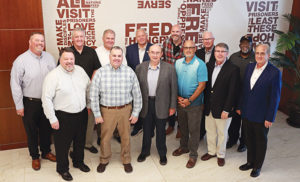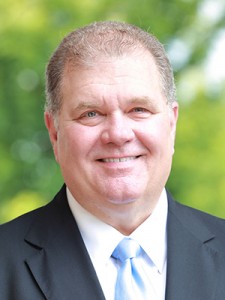By Lonnie Wilkey
Editor, Baptist and Reflector
lwilkey@tnbaptist.org

Several former presidents of the Tennessee Baptist Convention, along with current president Clay Hallmark, recently gathered at the Church Support Center in Franklin for a time of fellowship and discussion. Attending the gathering were: back row from left, Roc Collins, Ron Stewart, TBMB president and executive director Randy C. Davis, Dean Haun, Fred Shackleford, Bruce Chesser, Michael Ellis, and front row, from left, Larry Robertson, Hallmark, Ken Story, Poly Rouse, David Green, and Roger Freeman. — Photo by Royce DeGrie
FRANKLIN — Thirteen former presidents of the Tennessee Baptist Convention gathered May 12 at the Church Support Center to discuss opportunities and challenges, including future needs for churches in the convention and a question of whether the TBC president should have a second term.
The meeting was initiated by Randy C. Davis, president and executive director of the Tennessee Baptist Mission Board and a former convention president himself, in response to former TBC presidents expressing they felt they could serve Tennessee Baptists better in a second year with the experience gained in the first year.
It was the second time in about eight years that he has met with former presidents. “You guys are eagles and servant leaders who have invested so much in the life of the convention,” he said. “I wanted to discuss some things with you.”
He reminded the leaders that the convention will celebrate its 150th anniversary in 2024. He sought their ideas on how the convention can best celebrate the anniversary. The former presidents came up with several good ideas that will be passed on to the Tennessee Baptist Historical Committee which is charged with planning the event, Davis said.
Davis also noted that the convention’s Five Objectives, a strategic 10-year plan, will draw to a close in 2024. Davis said the Five Objectives were first articulated by TBMB leadership in response to discussions with the Vision 2021 (Ephesians 3:20-21) Strategic Planning Team formulated by former TBC President Poly Rouse and adopted by convention messengers in 2014.
Davis noted a different strategy will be employed for future goals. “We want to reverse the process and find out the needs of grassroots Baptists,” he said.
He said that during the Tuesday breakout sessions, which have been a part of the annual meeting for more than 10 years, will target messengers and solicit their dreams for the larger network of churches that comprise the Tennessee Baptist Convention. “We want to know what they see as priorities in our Great Commission work together in Tennessee in the years ahead,” he said.
Several ideas were suggested by the presidents, including finding ways to involve younger pastors in the convention and providing training on leadership.
Davis encouraged the former pastors to continue to think about and pray about the future and the upcoming anniversary of the convention. “It will be exciting to roll out a new paradigm in the days ahead,” he said.
The majority of the discussion time centered around comments Davis has heard from former presidents who believe a second one-year term would be beneficial.
Research has shown that Tennessee is one of the few Southern states that do not provide an opportunity for convention presidents to serve a second year, Davis said.
Since the early 1940s, Tennessee presidents have been elected to a one-year term on a rotating basis by the three grand regions of the state, he said. Prior to that, presidents served multiple terms, including legendary pastor R.G. Lee of Bellevue Baptist Church, then in Memphis, who served four terms.
Davis said this has been done based on tradition. The convention’s governing documents do not provide details for the election of a president other than they must be resident members of cooperating Baptist churches.
The TBMB leader also related that the convention began rotating the election of presidents according to grand regions of the state in 1953. In recent years, messengers have been surveyed about holding the annual meeting in a central location, but “there has not been a groundswell of support,” he said. Convention attendance is generally stronger in the east and it declines proportionally as it moves west, he added.
A president who has served two terms is not new, even in recent history. Poly Rouse, pastor of Hermitage Hills Baptist Church, Hermitage, completed the term of Davis in 2010 after he became executive director and then was elected to a full term in 2011.
Bruce Chesser, pastor of First Baptist Church, Hendersonville, served as president during 2020 and due to COVID-19, the convention was unable to meet, so he also served as president in 2021.
Both Chesser and Rouse said the extra year was helpful because the first year was basically a learning experience. “It was beneficial for me because of relationships that were developed,” Rouse said. “When you have two terms, you have multiple conversations. We can know one another better. That was my experience.”
Former president Larry Robertson, pastor of Hilldale Baptist Church, Clarksville, agreed that the first year is basically a learning time. “I can see the advantage of doing it a second time.” Other pros cited would be that the second term would allow the president to have more influence and it would provide stability to the convention.
The presidents agreed that the “cons” of allowing a president to have a second term is that it would break tradition, create confusion with the rotation system, cause the president to be away more from church and family and possibly be seen as a power play.
During the discussion, the concept of three regional vice presidents to go along with the first vice president and president was introduced and it garnered support from the former presidents who liked the idea because it would create more opportunities for Tennessee Baptists to serve in positions of leadership.
The group agreed that because nothing currently prohibits a president from seeking another term, it might be best to consider having regional vice presidents. Davis said the idea will be presented to the Constitution and Bylaws Committee because they would be responsible for introducing changes to the governing documents. The concept of three regional vice presidents would require approval by convention messengers over two years.
The presidents also agreed that should a president seek a second term, additional constitution and bylaws changes would probably need to be considered to codify the election process.
Current president Clay Hallmark sees the benefit of a president having the opportunity to have two terms, but he has not publicly announced plans to do so.
Davis said he sees the pros and cons of both sides of the issues and that would be left up to messengers to decide should a president seek re-election. “We had a healthy discussion that was beneficial. Whether our election processes change or not, we need to be prepared for whatever may occur.”
Presidents attending the session included Davis, Roger Freeman, Clarksville; Dean Haun, Morristown; Bruce Chesser, Hendersonville; Ken Story, Germantown; Larry Robertson, Clarksville; Poly Rouse, Hermitage; Roc Collins, TBMB; David Green, Greeneville, Clay Hallmark, Lexington; Fred Shackelford, Bartlett; Mike Ellis, Memphis; and Ron Stewart, Knoxville. B&R

